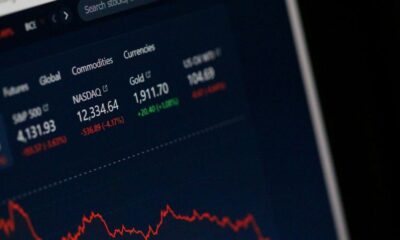Finance
Stock Market Volatility: Analysis of Recent Movements Driven by Economic Data Releases and Federal Reserve Decisions

The year 2024 has witnessed significant volatility in global stock markets, driven by a confluence of economic data releases, Federal Reserve decisions, and broader macroeconomic factors. Investors have been grappling with the implications of persistent inflation, rising interest rates, geopolitical tensions, and shifts in market sentiment. This report provides a comprehensive analysis of the factors contributing to stock market volatility in 2024, drawing on the most recent data and expert opinions.
Inflation and Its Impact on Stock Markets
Inflation has been a central theme influencing market behavior throughout 2024. The Consumer Price Index (CPI), a critical measure of inflation, has consistently exceeded the Federal Reserve’s target of 2%, with July 2024 recording a year-over-year increase of 4.6%. This persistent inflation has sparked concerns about the purchasing power of consumers and the profitability of companies, particularly those in sectors sensitive to cost pressures, such as consumer goods and manufacturing.
The stock market’s response to inflation data has been pronounced. For instance, when the June 2024 CPI report indicated higher-than-expected inflation, the S&P 500 experienced a sharp decline of 3% over the next few trading sessions. Growth stocks, particularly in the technology sector, have been disproportionately affected, as their valuations are heavily reliant on future cash flows, which are discounted more heavily in a high-inflation environment.
Federal Reserve Policies: Interest Rates and Quantitative Tightening
The Federal Reserve’s monetary policy has been a critical driver of market volatility. In response to rising inflation, the Fed has pursued an aggressive interest rate hike strategy throughout 2024, raising the federal funds rate to 5.5% by August 2024—the highest level in over two decade. This series of rate hikes has significantly impacted the stock market, particularly sectors that are sensitive to interest rate changes, such as real estate and utilities.
The Fed’s decision-making has been closely tied to economic data. For example, following a strong jobs report in May 2024, which indicated an unexpectedly low unemployment rate of 3.7%, the Fed signaled that further rate hikes might be necessary to prevent the economy from overheating. This announcement led to a sell-off in the bond market, with the yield on the 10-year U.S. Treasury note rising to 4.5%, and subsequently, equity markets also reacted negatively, with the Dow Jones Industrial Average dropping by 2%.
In addition to interest rate hikes, the Fed has engaged in quantitative tightening (QT) by reducing its balance sheet. This involves allowing its holdings of Treasury securities and mortgage-backed securities to mature without reinvestment, effectively pulling liquidity out of the financial system. The reduction in liquidity has contributed to increased market volatility, as it has made it more difficult for investors to access capital, leading to sharper price swings
Geopolitical Tensions and Global Supply Chain Disruptions
Geopolitical tensions have also played a significant role in stock market volatility in 2024. The ongoing conflict in Ukraine, coupled with rising tensions between the United States and China, particularly over technology and trade issues, has added layers of uncertainty to global markets. The conflict in Ukraine has particularly impacted energy markets, leading to volatile oil prices. For example, Brent crude oil prices surged to $110 per barrel in July 2024, driven by supply disruptions due to sanctions on Russian oil exports. These fluctuations in energy prices have had a cascading effect on various sectors, including transportation, manufacturing, and consumer goods, as companies grapple with higher input costs.
Additionally, global supply chains, already strained by the COVID-19 pandemic, have been further disrupted by these geopolitical tensions. The imposition of export controls and tariffs, particularly in the semiconductor industry, has created uncertainty for multinational corporations. This has led to increased market volatility, as investors reassess the potential impacts on global trade and the earnings outlook for companies.
Market Sentiment and Investor Behavior
Investor sentiment has been highly sensitive to the macroeconomic environment in 2024. The combination of economic uncertainty, aggressive monetary policy, and geopolitical risks has led to heightened fear and risk aversion among investors. This is reflected in the performance of market volatility indicators, such as the CBOE Volatility Index (VIX), which spiked to over 30 during several trading sessions in July and August 2024—well above its historical average of around 20.
The heightened volatility has also led to increased trading volumes, particularly in options and derivatives markets, as investors seek to hedge against potential downside risks. The increased use of algorithmic trading has amplified market swings, as automated trading systems react quickly to changes in market conditions. This has led to a feedback loop where volatility begets more volatility, creating a challenging environment for both retail and institutional investors.
Sectoral Impacts: Winners and Losers
The volatility in 2024 has had uneven impacts across different sectors of the stock market. While sectors like technology and consumer discretionary have suffered due to their sensitivity to interest rate hikes, other sectors have benefited from the current economic environment.
Energy Sector
The energy sector has been one of the few bright spots in the stock market, driven by rising oil and gas prices due to supply constraints. Companies in this sector have seen their stock prices soar, as higher commodity prices translate into higher revenues and profits. For instance, ExxonMobil’s stock price increased by over 25% in the first half of 2024, outperforming the broader market.
Financial Sector
The financial sector has also fared relatively well, benefiting from rising interest rates, which have improved the net interest margins for banks. As banks earn more from the spread between the interest they charge on loans and the interest they pay on deposits, their profitability has increased. This has led to positive stock price performance for major financial institutions like JPMorgan Chase and Bank of America.
However, it’s not all positive for the financial sector, as the risk of an economic slowdown due to aggressive rate hikes could lead to an increase in loan defaults, which would hurt banks’ profitability. As a result, while the sector has outperformed in the short term, it remains vulnerable to the broader economic outlook.
Long-Term Implications for Investors
The volatility witnessed in 2024 has significant implications for investors, both in the short and long term. For short-term traders, the increased market swings present opportunities to profit from rapid price movements, but they also come with heightened risks. Traders must be nimble and have a clear risk management strategy in place to navigate the current environment.
For long-term investors, the key is to remain focused on fundamental analysis and to avoid making decisions based on short-term market movements. Diversification remains a crucial strategy for managing risk, as it allows investors to spread their exposure across different asset classes and geographic regions. Additionally, maintaining a long-term perspective can help investors ride out periods of volatility without succumbing to panic selling.
Strategies for Managing Volatility
Given the current market environment, investors should consider several strategies to manage volatility:
Diversification: By spreading investments across various asset classes, sectors, and geographies, investors can reduce the impact of a downturn in any single market. For example, while U.S. equities have been volatile, emerging markets or commodities like gold might offer stability.
Quality Investing: Focusing on companies with strong balance sheets, consistent cash flows, and robust competitive advantages can provide a buffer against market downturns. These companies are typically better positioned to withstand economic shocks and recover more quickly.
Hedging: Utilizing options and other derivatives can help protect against downside risks. For instance, buying put options can provide insurance against a significant drop in stock prices, while also allowing investors to benefit from potential upside gains.
Staying Informed: In a volatile market, staying informed about the latest economic data releases, Federal Reserve decisions, and geopolitical developments is crucial. Investors should regularly review their portfolios and be prepared to make adjustments as new information becomes available.
Conclusion
The stock market volatility of 2024 has been driven by a complex interplay of factors, including persistent inflation, aggressive monetary policy from the Federal Reserve, geopolitical tensions, and shifting investor sentiment. While this environment presents challenges, it also offers opportunities for those who are well-prepared and can navigate the uncertainties.
Looking ahead, the key for investors will be to maintain a disciplined approach, focusing on diversification, quality investments, and risk management. By doing so, they can better position themselves to weather the current volatility and achieve their long-term financial goals.
As the world continues to grapple with economic challenges and uncertainties, staying informed and adaptable will be crucial for success in the stock market. Investors who can manage their emotions, stick to their strategies, and make informed decisions will be better equipped to navigate the turbulence and capitalize on the opportunities that arise.
-

 Press Release6 days ago
Press Release6 days agoNura Labs Files Revolutionary Patent: AI-Powered Wallet Solves the $180 Billion Crypto Staking Complexity Crisis
-

 Press Release4 days ago
Press Release4 days agoGlobal Compound Feeds and Additives Industry Report: Market Expansion and Competitive Insights to 2035
-

 Technology4 days ago
Technology4 days agoWhat to Know Before Switching Cell Phone Network Services in 2025
-

 Press Release2 days ago
Press Release2 days agoCrypto WINNAZ Launches First On-Chain Yield Engine for Meme Coins, Enabling 20x–300x Returns
































